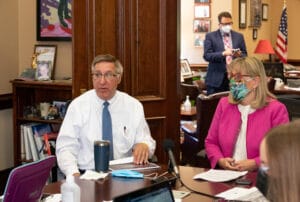
State Sen. Michael Rodrigues, left, and Senate President Karen Spilka, right, discuss the chamber's fiscal year 2023 budget proposal with reporters on May 10, 2022. State House News Service photo
Senate leaders on Tuesday rolled out a $49.68 billion state budget proposal for the fiscal year that begins in July, touting investments they said would help families living in deep poverty and share the state’s influx of cash with cities and towns.
The Senate Ways and Means Committee’s fiscal 2023 budget clocks in below the $49.73 billion version the House passed last month after adding millions in spending through the amendment process. It represents a $2.07 billion increase over this fiscal year’s budget, and proposes to spend $1.45 billion more than the budget Gov. Charlie Baker filed in January.
The committee approved the bill on a voice vote during a virtual executive session Tuesday afternoon, with Minority Leader Bruce Tarr reserving his rights and not taking a stance for or against the budget. Tarr said his lack of a vote was “not an indication of disapproval” but that he was still wading through the document to understand its nuances.
The Senate’s bill would boost the balance of the state’s stabilization fund to $6.74 billion by the end of fiscal 2023, above the $6.55 billion envisioned in the House’s plan.
Senate Ways and Means Chairman Michael Rodrigues said one of his goals when he stepped into the helm of the budget-writing committee in 2019 was to ensure the rainy day fund’s balance “rises to a point that will sustain us throughout the next recession.”
“We all know these economies are cyclical and we’re riding a very good wave right now of revenues, but there are certainly storm clouds on the horizon and every economist that we speak to warned of, you know, the r-word in the next calendar year,” he said.
Major investments that Rodrigues and Senate President Karen Spilka highlighted include $250 million to continue the Commonwealth Cares for Children stabilization grant program for early education providers through the end of this year, and a boost in unrestricted general government aid beyond the level proposed by both Baker and the House.
Baker has made a practice of raising unrestricted local government aid at a level that matches the anticipated growth in state revenues.
His bill and the House’s budget both use that approach, with a $31.5 million or 2.7 percent increase in the unrestricted general government aid line item. The Senate’s bill doubles that increase to $63.1 million, for a total of $1.23 billion in UGGA money.
“I think if I had words to describe this budget it would be ‘inclusiveness’ and ‘sharing,'” Rodrigues said. “Because of the fact that we have seen some robust revenues over the last year or so, we wanted to ensure that we share those with our local communities, many of whom are struggling at their level.”
The Senate budget matches the House with $6 billion in Chapter 70 aid to local schools and increased the per-pupil minimum aid amount from $30 to $60. On the higher education front, it includes $175 million for scholarships, $648 million for the University of Massachusetts system, $337.8 million for community colleges and $327.1 million for state universities.
Like the House, the Senate Ways and Means Committee did not pursue Baker’s nearly $700 million tax relief package inside its budget.
Tax Relief to Come Later
Senate President Karen Spilka said last week that she had directed Senate leaders to work on a tax relief package for this session. She looked forward to working with the House to explore that “after the conclusion of the Senate budget.”
Spilka’s comments came after the state in April took in more than $2 billion above what was expected in revenue collections for that month alone, bolstering what is on track to be a major surplus for fiscal 2022.
The Senate budget also does not include House measures extending free, universal school meals for another year, making phone calls free for incarcerated people and banning child marriage.
Senators could propose any of those House-backed policy measures as amendments, and Rodrigues noted that the Senate has previously voted to outlaw child marriage.
The Westport Democrat said he had no objection to the school meals and prison call sections but “just haven’t included them” in the spending bill.
“We focus on fiscal matters in our budget,” he said, saying the committee goes “very, very light” on policy sections in the spending bill.
Amendments to the Senate budget will be due this Friday, and the bill is teed up for debate starting Tuesday, May 24 after senators caucus that Monday.
The House’s budget debate featured Republican-led efforts to add tax changes like Baker’s to the spending bill, and the Senate’s three-man minority caucus could take a similar approach.
“We will consider every and any amendment that a senator files but at this point, we’re going to stick with the same consensus revenue number as the House and the governor used to compile their FY ’23 budget,” Rodrigues said.
Broadly speaking, Rodrigues said that when the Senate does pursue tax relief, the body will “focus on working families, and what provides the greatest amount of money back into the pockets of working families.” He said he had not “analyzed the good, the bad, the ugly of any of the governor’s tax proposals” and expected to also hear many ideas from his colleagues.
“The governor doesn’t have a monopoly on good ideas,” Rodrigues said.






